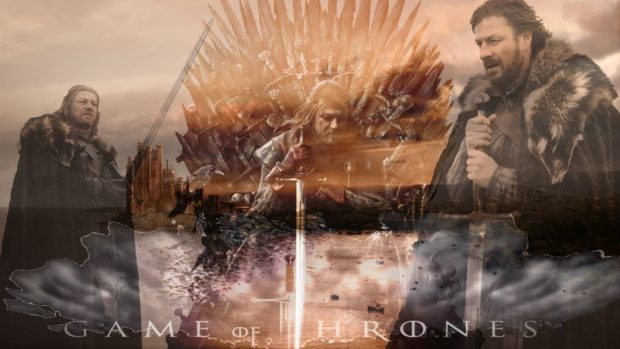
 Warning: Article contains SPOILERS
Warning: Article contains SPOILERS


With HBO preparing to launch its sixth season of “Game Of Thrones,” there’s little else that TV fans are talking about these days. Famous for offing powerful and popular characters, the show has settled into a compelling groove that appears to be heading ever-so-slowly toward its eventual climax. And as you ponder which characters will gain ground in the never-ending struggle for Westeros in season six, there’s one curious fact from the show’s history that might alter your perspective: being in power is essentially a death sentence. 

If that doesn’t make sense, consider some of the examples of prominent lords and leaders who’ve fallen already.


Robert Baratheon


Robert Baratheon should have been pretty much invincible. Having led a rebellion against the Targaryens, he was the unquestioned king of Westeros and held the Iron Throne long enough to grow fat and content. After all, he couldn’t even fit in his armor by the end! He had every advantage: the throne, powerful allies, and marriage to an elite lord’s daughter. But as we now know, he was done in by a boar, because no one can stay in power too long in “Game Of Thrones.”


Renly Baratheon


Renly seems to have been largely forgotten over the seasons, but let’s recall that at one point the former king’s youngest brother seemed the most powerful suitor for the Iron Throne (despite having a claim blatantly inferior to that of his older brother Stannis). MSN Entertainment, which frequently produces content relevant to the most popular television shows and films, included Renly on a list of the 25 most shocking deaths of the show (and even that only covers a portion of the deaths we’ve seen), and reminds us that he was murdered by a shadow. Indeed, the biggest army in Westeros couldn’t help this unfortunate lord survive. 


Stannis Baratheon


It’s tough to measure time in “Game Of Thrones,” but Stannis may actually have lasted the longest of any of the prominent lords and leaders we’ve seen. In part that’s because he spent quite a bit of time hiding out on his rocky island stronghold while his younger brother pursued the throne. When he finally emerged, Stannis was armed with the best claim to the throne, an army of his own, and a witch at his side. Yet he lost the Battle of the Blackwater, fled to the North, and ended up slain by Brienne of Tarth.


Eddard Stark


Ned Stark was one of the few lords and leaders who didn’t hold a significant advantage beyond his title. In fact, his status as the most honorable character in the story was a clear disadvantage from day one, as far as survival was concerned. Perhaps it’s no surprise he ended up with his head on a spike. 

Tywin Lannister

For some time, Tywin seemed to be the most infallible and dominant character in the show. Wealthy, powerful, and essentially able to control the kingdom without the hazard of actually sitting on the throne, he had it all. In fact, he was historically wealthy in fiction even beyond Game Of Thrones. According to an analysis done by Lottoland, an online scratchcard platform that likes to tease its hopeful players with fun examples of extreme wealth, Tywin ranks ninth among the richest fictional characters when their fortunes are estimated in real world wealth. All that gold, and Tywin couldn’t save himself from his own son.Â


Khal Drogo


A tribal leader might not have the same sustainable power structure as the average lord of Westeros, but Khal Drogo sure appeared to be in firm control of his faction of Dothraki back in season one. Indeed, being the leader of a tribe by virtue of being its best fighter is an advantage unto itself. But despite that and a marriage to a potentially powerful ally in Daenerys Targaryen, he succumbed to an infection made worse by a wicked mystical healer. Go figure. 


Jeor Mormont


As the Lord Commander of the Night’s Watch, Jeor Mormont never really shared the status of other lords, or even Khals, in “Game Of Thrones.” However, The Wall is almost presented as its own small nation within Westeros, and Mormont was its unquestioned leader. His primary advantage was one of tradition. Despite being comprised of ex-criminals, the Night’s Watch is designed as an honorable society of sorts, bound by vows and sentenced to a life of service regardless of who’s in charge. There just never seemed to be much reason for anyone to go after him from the inside, yet that’s just what happened.


Mance Rayder


The so-called King-Beyond-The-Wall was a mysterious figure for several seasons, but he certainly seemed to wield a lot of power. Being in charge of a wild people who refuse to kneel is sort of the best of both worlds in “Game Of Thrones.” On the one hand, you’re the leader; on the other, you’re not official, so there’s no need for anyone to mutiny or assassinate you. The semi-anarchist setup of the “Free Folk” was Mance’s greatest advantage, really—unless theories of his being Rhaegar Targaryen in disguise were true, in which case he might have had a few more tricks up his sleeve. Nevertheless, clashing with more organized society didn’t go very well for Mance, and he wound up executed by Stannis.

This is not, ultimately, a reminder that main characters can die in “Game Of Thrones.” That much is obvious. Rather, this is meant to emphasize that people in positions of power, in particular, appear to be the most vulnerable—no matter what advantages they appear to possess.

Leave a Reply